Pritigandha Giri, a young woman Community Mobilise, being associated with the Child Development Programme of CYSD in Malkanagiri, knows that “Covid-19 is not just a pandemic for sorrow, frustration, economic crisis and global slowdown; it is an opportunity for new way of living, adoption of new technology and self-reflection”.
Responding to Covid-19 outbreak, CYSD has put its effort to show innovative pathway on how to manage the Temporary Medical Centres (TMCs) effectively with a new name ‘Ekant Nivas’ engaging the migrant returnees throughout the day productively.
With the support from Gram Panchayat and Block administration, Pritigandha has been deeply involved in managing Dalpatiguda Panchayat TMC under Mathili block of Malkanagiri district from the day it was set up in panchayat high school. A total of 46 men and 11 women migrant returnees along with one boy child have taken temporary shelter for isolation in the centre.
Malkangiri being the southernmost district of Odisha is sharing border with Andhra Pradesh, Telengana and Chhattisgarh. The tribal district is very prone to migrant labour in cities like Chennai, Hyderabad, Visakhapatnam, Vijayawada, Kochi, Bengaluru, etc. The outbreak of Covid-19 and following the lockdown declared by the government compelled the migrants to come back to their native places. But, they did not have other way than joining the TMCs arranged at their Panchayats for self-isolation, as per the Government advisories.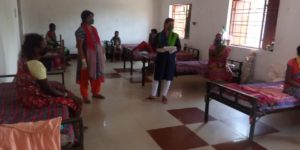
Dalpatiguda TMC was equipped with beds, drinking water and toilets, electric supply along with a set of accessories, like racks, dustbins, mosquito mat, bucket and mug for use by the migrants individually, even for entertainments, a sound system along with mike was made available.
Pritigandha puts her best effort to make the migrants feel at home paying regular visits to the centre and spending time in counselling them. Her daily works include ensuring timely supply of good quality of food to the migrants, keep the kitchen hygienic, cleanliness of toilets and surrounding with the support and cooperation of the Sarapanch, PEO and Ward members.
Moreover, she was ensuring physical fitness and mental health of the migrants through conducting exercises and yoga including health check-up and medication; and skill & aspiration mapping of migrants and exploring opportunities for their future employment. Practices of prayer with yoga and exercises in the morning and evening and reciting of patriotic songs helped the inmates to keep free from stress and undue panic and gave a sense of mental happiness. Appropriate information dissemination by her on COVID-19 packages declared by both the governments, entitlements and job open ups at Gram Panchayat level through MGNREGA has created new hopes among returnee migrants. Importantly, she also helped a lot in record keeping of migrants at the Gram Panchayat.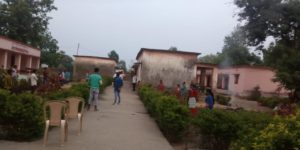
Mr. Damu Nayak, the Sarapanch of Dalpatiguda GP says, “The rich experience of CYSD on Disaster Management made our TMC unique at the Block level. We will continue extending all our support and administrative requirements to the organisation as and when required. I am really proud of CYSD and Child Fund India for their joint support and cooperation in fighting Corona.
Further, Madan Mohan Singh, PEO, Dalpatiguda GP said, “CYSD is doing commendable work not only in managing the activities of TMC and skill mapping of migrant returnees but also ensuring livelihoods of Migrants through MGNREGS connecting them in government schemes and programmes” .
Now, CYSD is in the process of installing five wash stations in Dalpatiguda TMC through which people can use both sanitizer and water without using hands. This technology will not only help the migrants at the centre but also more than 120 students after opening of this school.
“Managing TMC is one of the best experiences in my life. Listening to and solving day to day challenges of migrants, especially women and children gives me a sense of satisfaction. I find the TMC, a shelter which helps the migrants to respite and repair their mental and physical health and restore their skills for better livelihoods”, shares Pritigandha.
Bikas, a 7 years boy from Pangam village, returnee from Telangana with her widow mother – earning livelihood as a wood cutter, expressed his interest to learn more songs and prayers at the TMC and within 6 days’ time how he has learned “Ye Mere Watan ke logo”.
This model TMC has not only created good ambiances in the mind of tribal migrants but also bestowed faith of block administration on CYSD Programme team. Like, Dalpatiguda TMC, the team has been monitoring 21 such TMCs in 9 Gram Panchayats of Mathili, Khairiput and Korkonda blocks in the district.
 Since 1990, CYSD has got involved with WASH domain starting from low-cost toilet programmes to village cleanliness through work camps and awareness generation campaigns. In subsequent years, the organization has engaged in community awareness to save water; water security plans at the village and Panchayat level; school hygiene improvement; drinking water supply in urban slums of Bhubaneswar; testing water quality and portability; capacity building of village-level water and sanitation committees; promotion of use of sanitary napkins at urban & rural areas; and undertaking evaluations, etc.
Since 1990, CYSD has got involved with WASH domain starting from low-cost toilet programmes to village cleanliness through work camps and awareness generation campaigns. In subsequent years, the organization has engaged in community awareness to save water; water security plans at the village and Panchayat level; school hygiene improvement; drinking water supply in urban slums of Bhubaneswar; testing water quality and portability; capacity building of village-level water and sanitation committees; promotion of use of sanitary napkins at urban & rural areas; and undertaking evaluations, etc.
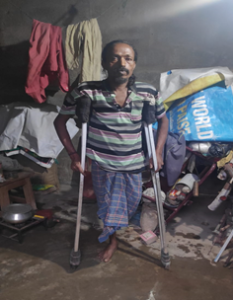 Ramesh Mohanty, 53, a person with disability survives on begging only. He was living with his wife and two sons happily in Salia Sahi slum of Bhubaneswar. Unfortunately, in 1999, he met an accident and lost one leg. This ill-fated accident not only made him physically challenged but separated him from the family; his wife and sons left him alone.
Ramesh Mohanty, 53, a person with disability survives on begging only. He was living with his wife and two sons happily in Salia Sahi slum of Bhubaneswar. Unfortunately, in 1999, he met an accident and lost one leg. This ill-fated accident not only made him physically challenged but separated him from the family; his wife and sons left him alone.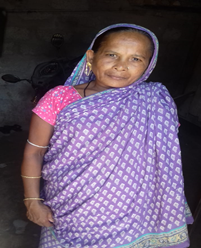 Pramila Sahoo, 55 years old widow, has been a resident of Maa Mangala Basti under Bhubaneswar Municipal Corporation, District of Khurda for last 20 years. She lost her husband before 16 years.
Pramila Sahoo, 55 years old widow, has been a resident of Maa Mangala Basti under Bhubaneswar Municipal Corporation, District of Khurda for last 20 years. She lost her husband before 16 years.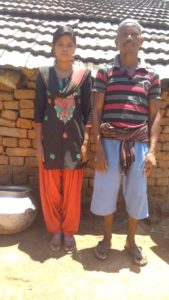 Sunati Naik, an Adivasi sponsored girl of 8 years, belongs to Nuapada village of Khandabandha GP in Thankurmunda block of Mayurbhanj district. She was well cared by her parents as well as two elder brothers. An unlucky incident occurred in her life at the age of five. Her mother passed away before Sunati began primary education. Kailash used to manage the family by doing labour. But having a lot of hopes in mind, Sunita attended village school together with mates regularly. She had a dream to study higher education and aspiration in mind to play a leadership role through participating in their Child Club activities. But a problem stood on the way when her brother got married. The wedded couple – brother and sister-in-law neglected her in many ways. Owing to the fact, her father got separated from the family. Facing financial problem, Kailash considered to stop Sunati’s education from 8th Std and decided to work outside in Bengaluru in a hatchery farm. With a remuneration of Rs. 7000/- per month he joined the work in year 2017. Here Sunita was waiting for her father’s return.
Sunati Naik, an Adivasi sponsored girl of 8 years, belongs to Nuapada village of Khandabandha GP in Thankurmunda block of Mayurbhanj district. She was well cared by her parents as well as two elder brothers. An unlucky incident occurred in her life at the age of five. Her mother passed away before Sunati began primary education. Kailash used to manage the family by doing labour. But having a lot of hopes in mind, Sunita attended village school together with mates regularly. She had a dream to study higher education and aspiration in mind to play a leadership role through participating in their Child Club activities. But a problem stood on the way when her brother got married. The wedded couple – brother and sister-in-law neglected her in many ways. Owing to the fact, her father got separated from the family. Facing financial problem, Kailash considered to stop Sunati’s education from 8th Std and decided to work outside in Bengaluru in a hatchery farm. With a remuneration of Rs. 7000/- per month he joined the work in year 2017. Here Sunita was waiting for her father’s return. Roji’s journey began with ‘Skills for Life’ – a programme for unemployed slum youth to make them gainfully employed. Unconsciously, Roji’s personality traits transformed and she began showing keenness in learning skills with confidence. The slum community, where she stays, could not digest this transformation in a poverty-stricken underprivileged girl and Roji became a part of every discussion in the community. She underwent the Retail Sales Associate Training programme of CYSD and like other youngsters, she learnt life skills, self-presentation with dignity and the art of being a good sales person who can pitch anything with confidence.
Roji’s journey began with ‘Skills for Life’ – a programme for unemployed slum youth to make them gainfully employed. Unconsciously, Roji’s personality traits transformed and she began showing keenness in learning skills with confidence. The slum community, where she stays, could not digest this transformation in a poverty-stricken underprivileged girl and Roji became a part of every discussion in the community. She underwent the Retail Sales Associate Training programme of CYSD and like other youngsters, she learnt life skills, self-presentation with dignity and the art of being a good sales person who can pitch anything with confidence.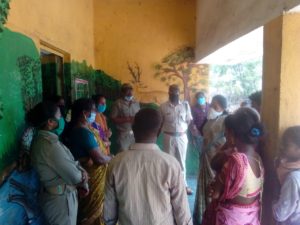 Safeguarding the children of its operational areas through formation and strengthening of Village Child Protection Committees (VLCPC), is one of the strategies of CYSD. In 2019, around 10 VLCPCs were formed and supported in 10 villages under 2 Gram Panchayats of Kolnara block in Raygada district. These committees have been actively engaged in ensuring child rights and protection in respective villages. While ensuring the rights of children and their protection, two major issues are being taken up by the VLCPCs for community resilient i.e. Child Marriage and Child Labour. During the lockdown owing to the Corona pandemic, the intervention of VLCPC of G. Rengalpadu village in arresting an early marriage case has caught the attention of the local people as well as the Block and District Administration.
Safeguarding the children of its operational areas through formation and strengthening of Village Child Protection Committees (VLCPC), is one of the strategies of CYSD. In 2019, around 10 VLCPCs were formed and supported in 10 villages under 2 Gram Panchayats of Kolnara block in Raygada district. These committees have been actively engaged in ensuring child rights and protection in respective villages. While ensuring the rights of children and their protection, two major issues are being taken up by the VLCPCs for community resilient i.e. Child Marriage and Child Labour. During the lockdown owing to the Corona pandemic, the intervention of VLCPC of G. Rengalpadu village in arresting an early marriage case has caught the attention of the local people as well as the Block and District Administration.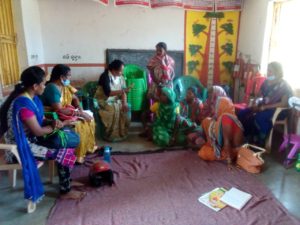 G. Rengalpadu is a tribal dominated village situated about 5 kms away from Kolnara GP and the block headquarter of Rayagada. In last week of April, a 19 years boy fled away one girl of 16 years to his home and asked his parents to organise their marriage. His parents also agreed to bind them in marriage. Getting this information, the VLCPC members counselled both the children and their parents to refrain from doing this illicit act. But the boy and girl threatened to commit suicide if their marriage would not happen. So, the VLCPC informed to the ChildLine to handle the case. The officials from the ChildLine tried to counsel both the children and the parents, but failed to persuade. Meanwhile, the VLCPC got to know about the children’s plan to elope elsewhere, so the committee took the issue to the Police. With the intervention of the Police and the Child Marriage Prohibition Officer the children’s marriage plan was stopped. The girl has been sent to CCI for temporary shelter as her parents denied to take her back to home. Also, the CWC has ordered to enrol the girl in a residential school for study after lifting of the lockdown and continue till she completes 18 years, the legal age of marriage.This incident has created a great impact in the locality. The joint efforts of the CYSD and Child Fund India towards formation and strengthening of VLCPC, as an effective mechanism at the community level to arrest child marriage and child labour, have been appreciated and recognised by the District and Block Administration.
G. Rengalpadu is a tribal dominated village situated about 5 kms away from Kolnara GP and the block headquarter of Rayagada. In last week of April, a 19 years boy fled away one girl of 16 years to his home and asked his parents to organise their marriage. His parents also agreed to bind them in marriage. Getting this information, the VLCPC members counselled both the children and their parents to refrain from doing this illicit act. But the boy and girl threatened to commit suicide if their marriage would not happen. So, the VLCPC informed to the ChildLine to handle the case. The officials from the ChildLine tried to counsel both the children and the parents, but failed to persuade. Meanwhile, the VLCPC got to know about the children’s plan to elope elsewhere, so the committee took the issue to the Police. With the intervention of the Police and the Child Marriage Prohibition Officer the children’s marriage plan was stopped. The girl has been sent to CCI for temporary shelter as her parents denied to take her back to home. Also, the CWC has ordered to enrol the girl in a residential school for study after lifting of the lockdown and continue till she completes 18 years, the legal age of marriage.This incident has created a great impact in the locality. The joint efforts of the CYSD and Child Fund India towards formation and strengthening of VLCPC, as an effective mechanism at the community level to arrest child marriage and child labour, have been appreciated and recognised by the District and Block Administration.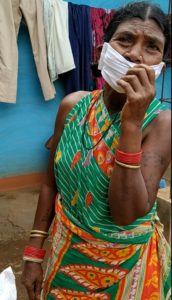 On receiving the relief kit, happy Laxmi further said, “the relief kit will let her to have food for 7 more days. Meanwhile, I should explore job opportunities under MGNREGS. Being a job cardholder, soon I will give an application to make use of my card for getting individual labour work at the Panchayat. I foresee and hope under the MGNREGS there must be job openings to overcome distress till the situation comes to normalcy’.
On receiving the relief kit, happy Laxmi further said, “the relief kit will let her to have food for 7 more days. Meanwhile, I should explore job opportunities under MGNREGS. Being a job cardholder, soon I will give an application to make use of my card for getting individual labour work at the Panchayat. I foresee and hope under the MGNREGS there must be job openings to overcome distress till the situation comes to normalcy’.
